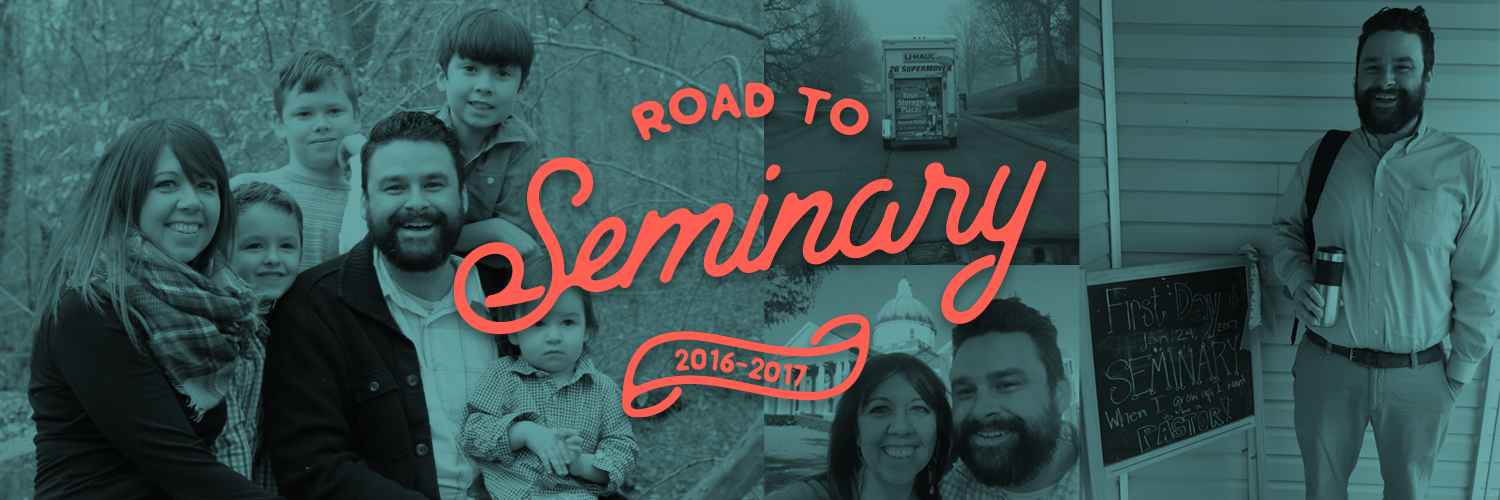This post is the fifth of six posts about making our way to Birmingham, Alabama to attend Beeson Divinity School.
Here’s the story. In December of 2016, Janie and I made two trips to Birmingham to find a place to live. I could not go with her on the second trip, but she secured a freshly renovated 3 bedroom bungalow not far from Beeson’s campus. Things were moving right along until the landlord backed out. She wanted to sell the property before I would have finished school. We made a third trip and struck out again. We were getting desperate. In a panic, we connected with a friend-of-a-friend-of-a-friend who was a real estate agent. She agreed to find some properties that might meet our needs and tour them over FaceTime with us. From what we could tell, the Cooper Avenue house would be fine. It seemed roomy enough and clean. It was at the top of our price range, but we knew that we weren’t going to do any better and get any closer to the city. We discussed, prayed, and discussed some more. I didn’t want to start 2017 without having a place secured and I couldn’t justify another trip to Birmingham. I signed the lease. It was done.
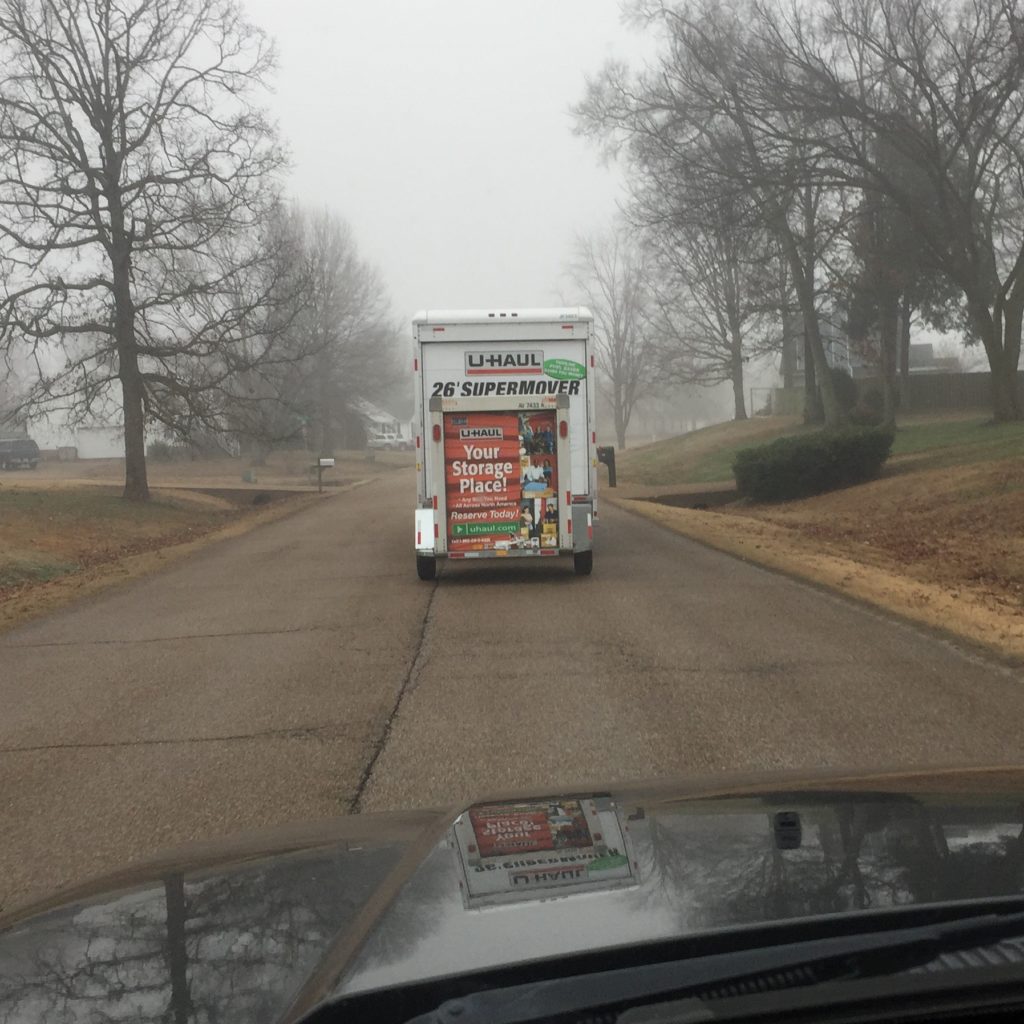
The day we rolled into Trussville, I was driving the U-Haul with a small trailer attached. Janie was in my truck. Her parents were driving our van down the next day with all of the kids. A small team of Beeson students we had never met were scheduled to help us unload. As we wove through the winding roads to get to our neighborhood, I wasn’t liking what I saw. The town seemed depressed. I’m not sure any houses in the Birmingham area had been built prior to 1955 and very few have been built since 1975. I was beginning to get nervous. Still, there were ponds and the rolling hills felt a little like being in the mountains so I was optimistic. That is until we arrived.
Our new home sat atop a steep mound of clay. There really is no way to describe how dramatic–and discouraging–this was. The front yard felt like a 45˚grade that began at the curb and led all the way to the staircase. The driveway, which matched the same profile, would barely allow my Jeep to drive up without scraping at the bottom or the top. There was not a flat surface in sight. The backyard was not much better. There was no way the moving van would make it up the driveway. My heart sank as I realized we were going to have to carry every one of our possessions and pieces of furniture up that driveway. And by “we,” I am referring to the half-dozen seminary students I had never met. I was in no position to pay them; what I had hoped had been offered as brotherly service I feared would become a cause for mutiny. Thankfully, we had spent our last bit of money on movers who would show up in a couple of hours, but they all made the best of it and I’ll probably end up scrubbing their toilets in heaven for all eternity. I’ll never forget them.
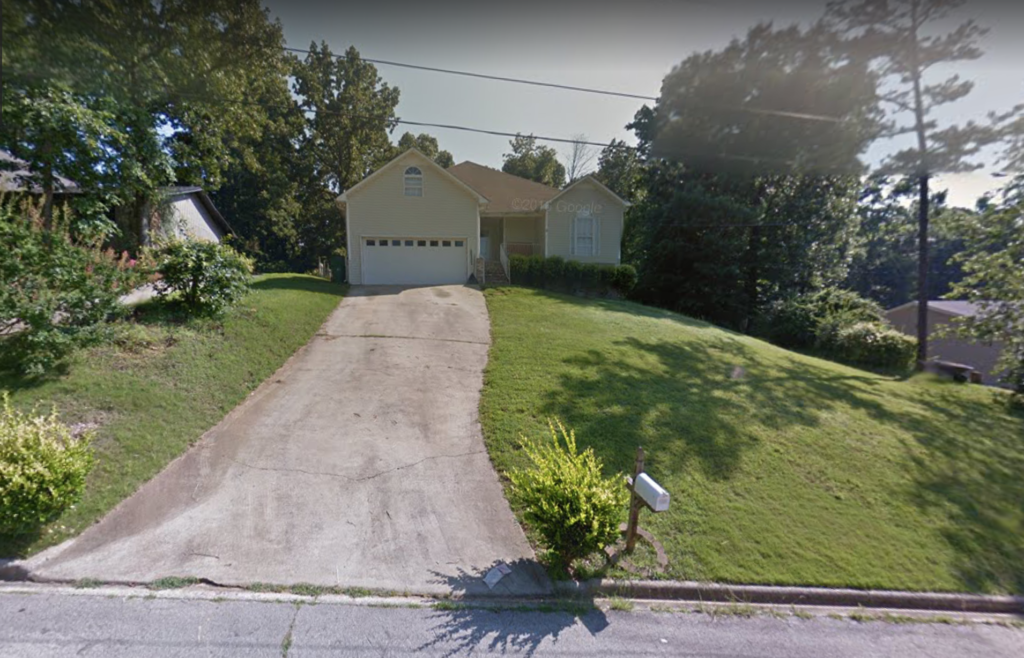
We got settled in. Janie found a flat enough surface to place the trampoline. There wasn’t a fence for the dogs so we had to get used to taking them out on leashes again. It took a few months to figure out that we didn’t have to park both vehicles on the street. Janie drove my truck for the first semester because we thought the van would scrape if we tried to pull it into the garage. It does, but we eventually started doing it anyway. It turns out that my truck’s brakes work well enough that I can park in the driveway. The bedrooms are smaller so the boys are more cramped than they were used to. We quickly learned that Alabama is home to one of the largest species of cockroaches in the world. Their international headquarters is somewhere within our walls. Dad and Merri helped us unpack and that Sunday, we were all alone in a new house, in a new town, in a new state, in a new season. Dillon, the same kid who was so proud and excited that I “got applied to seminary” now wept in his bed like a grown man. We all wept with him. What had I done?
I really wouldn’t have done any of this if it wasn’t for the church. I mentioned in a previous post how I never felt at home in the church, though I desperately needed to. After my first couple of years in Jackson at Christ Community Church, I began relishing any time I spent in any church. I’d visit any church when I was out of town. I attended Mass with Catholic friends. Megachurches with family members. Janie and I even visited a Greek Orthodox church in Atlanta. The Church was becoming my home; I felt I was among family no matter which church I was at. It was incredibly joyful, actually. But no church was as formative for me than Christ Community Church.

To be honest, I didn’t really want to go. I visited CCC because Kirby’s friend Ross was an elder there and he had arranged for Kirby and me to play music in a service when I visited Jackson in the fall of 2001. After I moved there, I visited a few churches in the area. CCC was tiny. It was a little bland, too. The music was awkward and I was the only young adult. This is not what I had in mind. Where were the pretty Christian single girls I was looking for? Where was that hip worship team I could play with? Well, not at CCC. I honestly think it was the Denkers that did it for me.
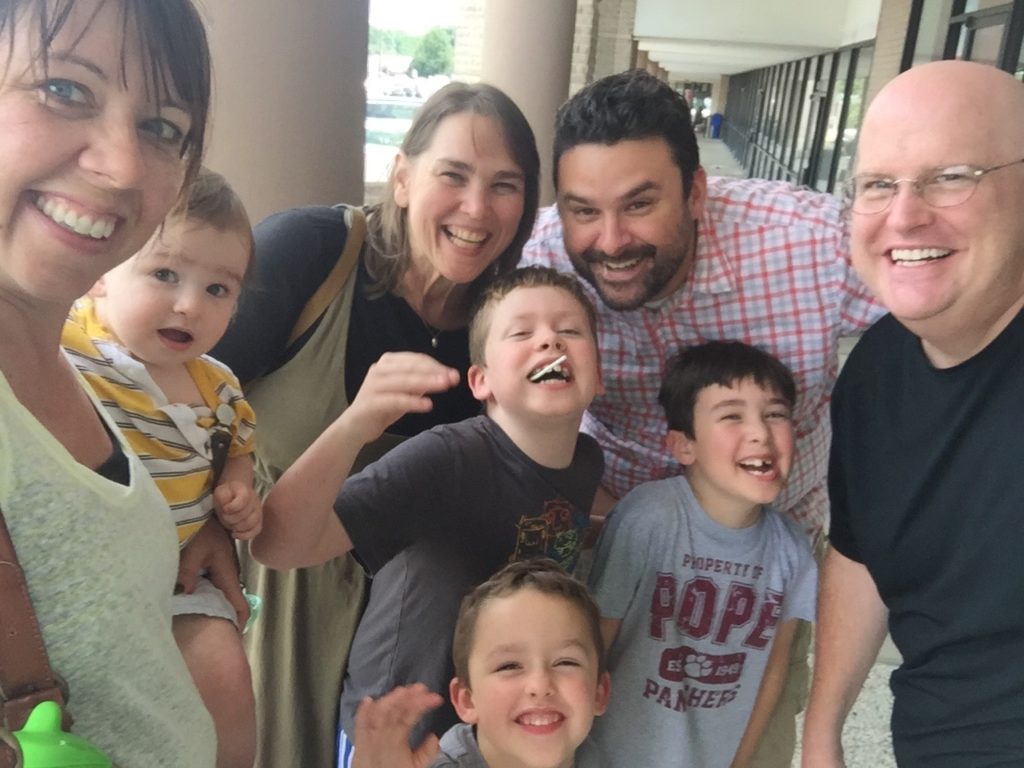
Brian and Cindy Denker are a couple who are about ten years ahead of me in life. They had just returned to Jackson the previous year. He had been struggling with mental illness and she was adjusting to the legally blind life. They had been dejected by previous ministry experiences and their marriage was in trouble. By the time I showed up, they were healing and growing. I met them at a very vulnerable time. I had a first-row seat to what the Lord was doing in their lives. I lived with the Denkers for my first three years in Jackson.
The Denkers are unlike anyone you’ll ever meet. Brian is the kindest, gentlest bear of a man. He struggles with OCD so he can’t make a decision to save his life. Cindy, on the other hand, is quite the opposite. I don’t mean that she is unkind, but that she is confident and decisive. As you can imagine, this dynamic played out in many unhealthy ways, but by the time I showed up, they were learning. Beyond their generous hospitality, Brian and Cindy have a unique way of caring for others. They listen. God, did they listen? They listened to me day after day. Cindy was getting good at it, too, since she was going blind. You never know how important listening is until you lose your eyesight. Then they’d ask questions, especially Cindy. Probing questions that would get me to talk. Day by day, week by week, they whittled away at a crust I had developed around me. I became more and more vulnerable and willing to let them in. I wrote songs in their house. I ate meals with them. I went everywhere with them. I’m sure they got sick of me, but I couldn’t tell. I loved them. It was probably a year before Cindy confessed that she still didn’t know who I was, but she kept at it and whittled me down. I’m not sure Brian is capable of judging anyone, which was great for me because I knew I could confess anything, confide in him, and never lose an ounce of respect from him. Brian and Cindy were the church for me.
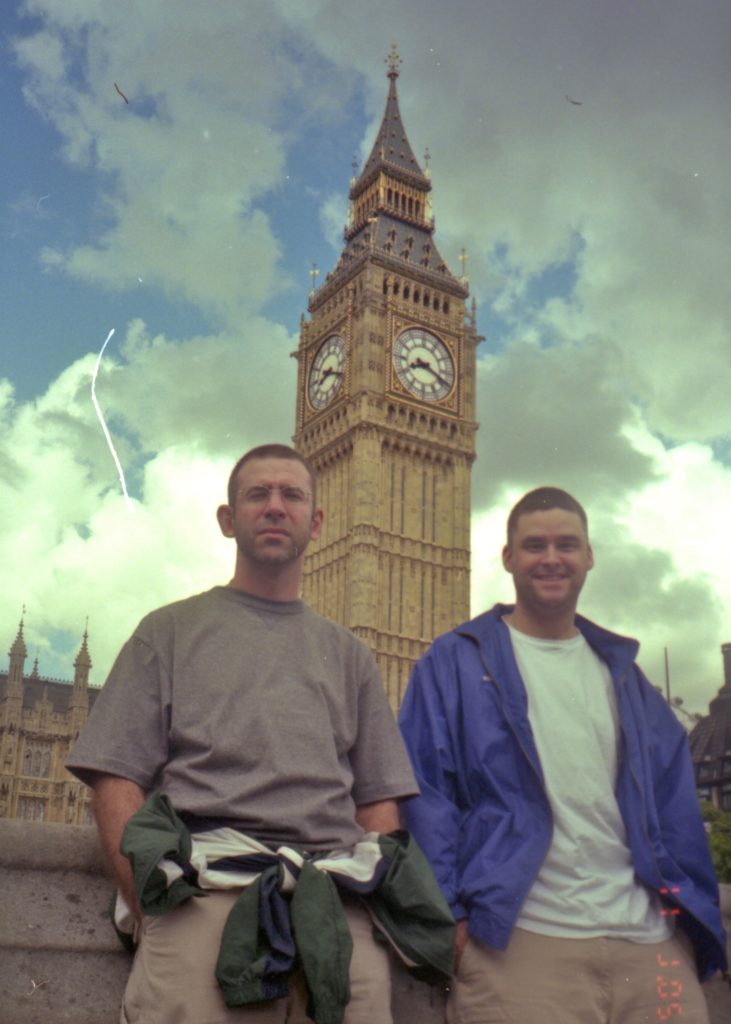
That wasn’t available anywhere else. I tried a charismatic church, a seeker church, and even a reformed baptist church. But CCC knew me and that was what I was desperate for: to be known. Ross was there, too. Like Cindy, he asked a lot of questions, but he talked a lot, too. He was always talking about following Jesus this, and discipleship that. I was starving for it. “I want to pastor men’s hearts,” he would tell me. Ross, Ben, Patrick, Brian and I would drink coffee on cold Sunday afternoons and take long walks to talk about John Piper’s Desiring God or C.S. Lewis, or Lord of the Rings. It was men talking about being disciples of Jesus, not in a contrived sort of way, but with intense honesty. Ross was my pastor and very little of it had to do with the actual church. It was a community and hospitality and family and discipleship.
But the church was more than this. There were other people at church, too. BJ and Johny were there. The Johnson family. Dennis and Caroline. Dave and Shirly Pooly (he called me Little Richard once). I didn’t really know these folks well at the time, but they were there. The church wasn’t just people I knew and who knew me, but folks I didn’t know very well, folks it would take me a long time to know. Others I would never get the chance to know. I was beginning to develop an intimate picture of what the church is. In this tiny microcosm we call the local church, we had traditions, music, generations, ideas, histories, gifts, children, old, young, all of it–gathered in a single place for worship and fellowship. This had not been my experience with the church before this. The church was always full of people you’d never get to know. The church was a place you just went to for a couple hours on Sunday morning. The church was a place they sang songs you would never listen to anywhere else. The church was a place of obligation. That’s not what this was. This was home. This is where people knew me. This is where I exercised my gifts. This is where who I was mattered to others. And most importantly, this was a place where I met with God.
Christ Community was a unique situation. It was not affiliated with a denomination so there was quite a bit of freedom. It was the product of a merger that had not gone so well. When I began attending, the angry and the aged had moved on. It was a church primed for ministry. We grew. One by one, families began to show up. They were mostly young families who went to college with Ross, his wife, and the Denkers. Slowly families began buying and renting homes in the same neighborhood. The church was involved with Downtown Christian Academy, a private school for a small group of inner-city kids who needed help. Ben Hickey had moved to town to teach at the school. CCC was becoming a hub of activity and discipleship.
Beneath the surface of all of this were some significant developments that would impact my own ministry as well as CCC’s. There is no simple way to explain it. Perhaps because of its denominational distance, size, and history, it became somewhat of an experiment. No one thought of it as an experiment, but I don’t know how else to explain it. We might say it began with Reformed theology. This was taboo among Evangelicals in the early 2000s, especially in a Baptist bastion like Jackson. There weren’t too many places to engage with Calvinistic theology in those days. It was the sort of thing that you needed a speakeasy to discuss. Over the next five or ten years, we’d hear about the casualties of the new Reformed movement. So-and-so was fired from his church because it was discovered he was a Calvinist. It wasn’t like that at CCC. Still, Reformed theology was only the beginning. Luther and Calvin, it was discovered, wanted to return to the sources. As it turned out, the Reformers were the gateway to the Church Fathers. As a non-denominational Evangelical church, we had no model to follow in our search for a Patristic faith. The only two sources we knew of were Roman Catholics and Eastern Orthodox. If we had to hide our Reformed affinities, imagine what we needed to do with these influences! The experimentation began. It started with Advent.
Originally, our services began with a set of songs to sing, perhaps followed by some prayer. A 30-minute sermon would follow and we’d dismiss. One year, we decided to observe Advent with a little liturgy. It was well received, but we returned to our regular worship format for the next year. I’m not sure how it progressed, but eventually, we kept the liturgy going after Advent. Within a year or two, we were following a traditional liturgy regulated by a lectionary. From the pew, it seemed we were all on the same page. We lost a family or two because we were becoming “Catholic,” but we’d gain more as we went on. Next, we transitioned from quarterly communion to weekly “Eucharist.” Brian was teaching church history in adult Sunday school. We were learning about where we came from, our heritage.
Then came the wine. Boldly the elders taught why we were moving to real wine at communion. Fearful of backlash and contention, we spent weeks listening to the teaching. Teaching and teaching and teaching. Then it happened. No backlash. No contention. Just joy. From what I remember anyway. Little tweaks here and there would take place over the course of time. A Paschal candle was added at Easter. We tried an acolyte ministry and processing a cross. But the stress fractures were beginning to show. How far can a small congregation like this go? We’d soon find out.
Throughout all of this, I was leading the music ministry. I had never led anything so taking this responsibility required some self-discovery. It started by agonizing over which songs to sing each week. Eventually, it became second nature. I loved it. I hated having to get a full-time job eventually. Music ministry is what I wanted to do as my full-time job. Was I being called to full-time ministry? Did I have what it took? I dreamt about it for years, but I never wanted to leave CCC. It was home. Through the years, though, something else was taking place. As I grew more comfortable in music ministry and leadership, I began thinking about the congregation. Interactions with congregants throughout the week factored into song selections. As I led a hymn in the service, I would think about a family or someone sitting in the pews. Without calling them out, I naturally encouraged them from the platform. Music ministry was changing from serving a church to pastoring a people. This must have been noticed by the elders because they started asking me to teach a Sunday school class here and there. This terrified me, but the more I did it, the more alive I felt.
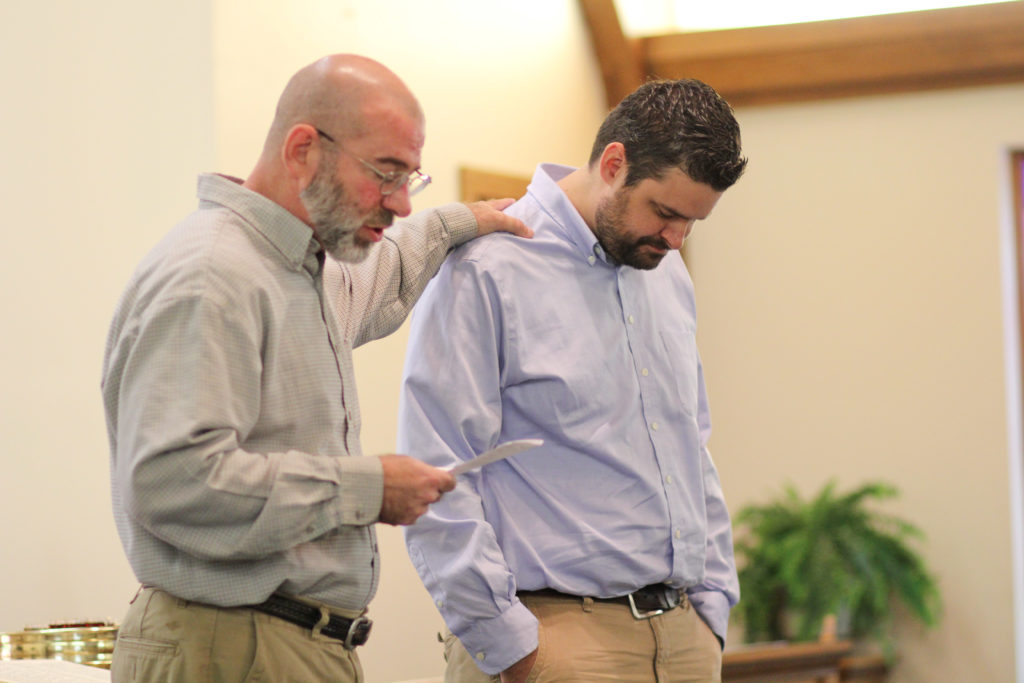
Eventually, the call came. The first sermon I preached after this was at a friends country Baptist church. The text was 1 Kings 18:20-40. I donned my suit and stepped into the pulpit with my manuscript. It was exhilarating enough to continue but terrifying enough to proceed with caution. I was ordained an elder at Christ Community Church on October 2, 2011. I continued as the music minister, but with more preaching and teaching responsibilities. I had already enrolled at Union University to finish my bachelor’s degree. My eyes were set on Beeson Divinity School from the outset. I finally graduated from Union in July of 2014. The next day, my church home fell apart.
It is far too complicated to relay here, and my own perspective would only reopen old wounds. I suppose it is sufficient to say that we had ourselves a good ole fashioned church split. The stress fractures of our liturgical community experiment had held for a long time. We had all been stretched. Some wanted to keep going, others didn’t. Perhaps this could have gone on indefinitely if money had not been involved, but that was not the case. Money became political and politics got ugly. The day after I received my undergraduate degree, Ross, my mentor, spiritual director, pastor, and best man, resigned from the church to join the local Anglican church and pursue the priesthood.
They didn’t all leave at once. The Denkers had already moved to Ethiopia as missionaries. A couple of other families had left that spring, too. To my mind, God was changing the seasons already. Only a few folks left to join the Anglican church that morning. It didn’t seem like a split was going to occur after all. It would take another couple of years for folks to trickle out. Most left to become Anglicans. The rest either moved away or joined other churches. The hardest part for me was watching the church family–who had loved me and who formed my community–leave. We all tried to be friendly and amiable, but it hurt. I was in leadership. There is no way to avoid feeling the responsibility for the breaking of fellowship.
There is a kind of stability that cannot be trusted. It is a temporary stability. Houses are like this. We need to make a home, even if it is for a short period of time. But houses crumble, burn, and sell. It would seem like your local church should stand forever. Christ Community Church was the most stable thing I had ever been a part of and it crumbled. On my watch, too. I could have done things differently. The eldership could have done things differently, but I don’t know that that would have made things more stable. It would take a novel to explain what was one of the most painful events in my life. I had become disillusioned and embittered. If I was teetering on a mid-life crisis, I launched headlong into it between 2014 and 2016. I did not know if I wanted to continue in ministry. Jackson was no longer a home for me. My world had been rocked. In time, however, the Lord lifted up my countenance. As painful as it was, I’m grateful for our church split because had it never occurred, I would never have wanted to leave. This, they say, is exactly why the church had to suffer persecution in Jerusalem. They were huddling until they had to flee for their lives. That is how the gospel was spread to the ends of the earth.
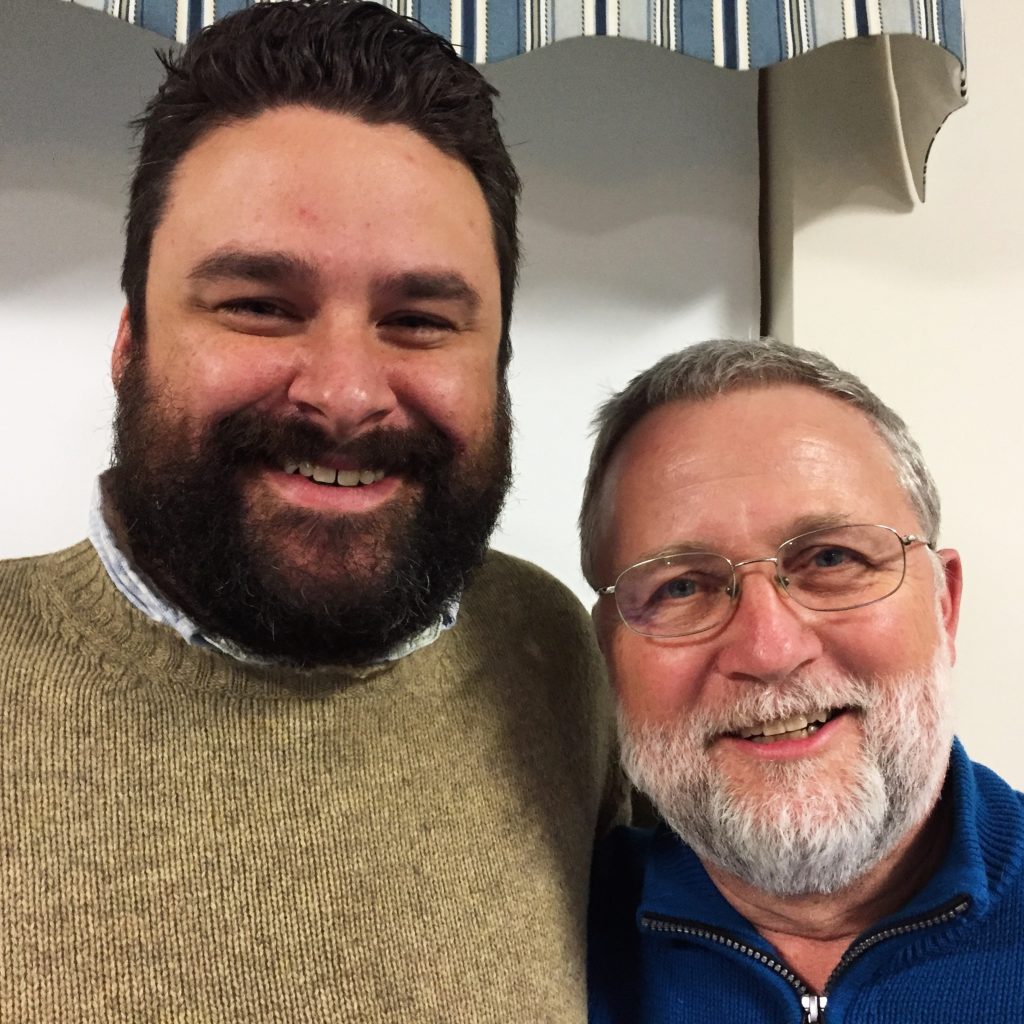
To say that Christ Community Church crumbled is not exactly fair. Those we left behind are still gathering, still worshiping, and still ministering. Our parting was difficult and I struggled with feeling like we too had abandoned our church family. We did our best to leave well. We gave as much warning as we could and tried hard to express our love and gratitude. They sent us out with their blessing and goodwill. We miss them greatly.
In Birmingham, Janie and I faced a new challenge I had not faced in many years, a challenge neither of us had faced together: finding a new church. Given the brief synopsis of our pilgrimage above, this was not easy. Prior to the church split, I had always assumed I would join an Anglican church due to its sacramental, liturgical, and evangelical commitments. In January of 2016, this was no longer the case. It wasn’t that these commitments no longer appealed to us, but that Anglicanism was a bitter taste in our mouths. I knew that it had to be honestly considered, but I really didn’t want to. It hurt too much. Besides, the folks at CCC had sent us out and I knew that we’d just be pouring salt into the wound if we were to become Anglican. We had to be open to other options.
I was sick as a dog our first Sunday in Birmingham. We had been looking all week for evangelical churches that might be somewhat liturgical. We had to decide on our non-negotiables. How would proximity figure into the equation? What denominations would we consider? What theological distinctives would we require? We came up with a short list of possibilities. There are a number of evangelical church plants in the Birmingham area that met our criteria, which we tried to keep to a minimum. That first Sunday, we arrived at one of them a few minutes late.
The lights were dim and the worship band was rocking. We sang some familiar songs, which was frustrating to me because I had lost my voice. We met several folks at the greeting time and I tried to scratch out my name to people. It was a young congregation with lots of hipsters. There were several young families and it was surprisingly multi-cultural and urban. The preaching and music were great. It was a bit far from our house, but I could envision our family there. I hate shopping around so I try to find reasons not to return rather than reasons to stay. This was a great church, but the way communion was handled gave me pause. What I’m about to explain is important to understand my family’s journey, but is in no way meant to speak badly about this particular church.
The time for communion came. I’m sure there was a brief “fencing of the table.” This is where communion is explained and the congregation is encouraged to partake given the church’s position on the sacrament, or ordinance in this case. Bread and wine were available to the side of the platform and congregants were encouraged to come at their own discretion. However, there were no words of institution read or spoken. The words of institution are important in sacramental theology. They are the words Jesus spoke at the last supper and they include “take, eat, this is my body” and “drink of it, all of you, for this is my blood of the covenant which is poured out for many for the forgiveness of sins” (Matt. 26:26-28). To see communion as a sacrament, these words must be spoken by a pastor because he speaks in Christ’s place. If Christ says the elements (bread and wine) are his body and blood, they really are his body and blood. How this occurs is an age-old controversy. Most Protestants reject the Roman Catholic concept of transubstantiation. This is a view that seeks to philosophically solve the mystery of how bread and wine become Christ’s body and blood. Martin Luther rejected the specifics of transubstantiation because it was speculative. He maintained a sacramental view but was glad to leave the “how” in the realm of mystery. The baptistic background from which I come holds a “memorial-only” view, which says the bread and wine are in no way the body and blood but are merely reminders of Christ’s incarnation and suffering. During my time at CCC, I had moved away from this view to something that resembled Luther’s definition of communion. That morning, I realized how important to me sacramental theology had become.
We left church quickly because it was Super Bowl Sunday and we were rushing over to Atlanta to watch it with my dad (the Falcons had made it). On the two-hour ride, Janie and I discussed the service. We had no intention of joining the first church we visited so we talked about the other churches on the list. My Evangelism professor, Lyle Dorsett, was the priest of the Anglican Church that met in Beeson’s chapel. I loved him immediately. I had remembered how enthusiastic he was celebrating communion when I had visited his church in 2012. I had my apprehensions against Anglicanism, but Fr. Lyle’s charisma and the beauty of the chapel were enough for us to push through. The other reason Christ the King Anglican Church won our vote for the next Sunday was that we had met the Breedloves.
Steven Breedlove was a fellow Beeson student. He was near the end of his M.Div. when we moved to Birmingham, but everyone I met on campus told me I had to meet him. He and his wife, Courtney, had three children and were about our age. It is hard to overstate what an encouragement this was for us. To be older, married, a father, and survive seminary! Steven did more than survive, he excelled. Janie and Courtney met our first week in Alabama and our children became instant friends. The Breedloves are Anglicans and Steven was working part-time at Christ the King while at Beeson. As my family stepped foot into Hodges Chapel that morning, the Breedlove children motioned for the Williams children to join their pew.

I fight tears as I write this because following God’s call for me had already cost my family greatly. I knew it would take some time before we would settle into a church, but I wanted to find that as soon as we could for their sake. My prayer was that we’d land in a church where Janie and the boys would have community during this difficult season of life. It was our second Sunday and it already felt like home.
The liturgy was familiar for all of us. CCC had drawn much of its liturgy from the Book of Common Prayer so there weren’t any surprises. Anglicans bow and cross themselves, so that was a little strange for us. The Great Thanksgiving (communion prayer) was long, but there were Words of Institution. The hymns were familiar and they even sang obscure Robin Mark songs I had taught CCC years before. Fr. Lyle preached a fiery sermon and I was filled with joy. I hated it; it felt like betrayal. I knew we were in a different city and I knew that we had not followed the others who left CCC but I felt guilty anyway.
We went back the next week and the week after that. As comfortable as we were feeling at the church, we had a lot of questions about Anglicanism. The decision of where to go to church had the added pressure of denominational commitment. I would be seeking ordination in whatever church we joined. Was I willing to commit to this tradition? This was my struggle for the whole semester. I wrestled with the liturgical disillusion that had resulted from the church split. On the other hand, there was much to learn. Still, I struggled to see myself as a priest and I had no idea if I could ever baptize an infant. I just didn’t know. Perhaps I was too rash and needed to give the non-sacramental options another chance. Perhaps God was calling me to be a Baptist church planter with a sacramental theology. Was that theologically possible? The other baptists at Beeson insisted that it was. I just couldn’t figure it out. We visited Jackson multiple times that semester and I dreamt of returning to CCC after seminary. Surely God wasn’t calling me to become an Anglican.
We attended Christ the King every Sunday that semester. Every Sunday was filled with joy, but the weeks were filled with uncertainty and anguish. We’d hear the disappointment of folks back home when we’d tell them we were visiting an Anglican church. When asked what denomination we were a part of, I’d tell fellow seminarians with a transparent lack of confidence that we were considering Anglicanism. This was like baiting a shark with a drop of blood for other students and professors who were committed to other traditions. Some would try to sway me from Anglicanism, others would simply tout the merits of their own traditions. Some did both. I desperately needed peace.
Peace eventually came, but not in the way one might expect. Graciously, my bread-and-butter client, 4Memphis, had agreed for me to continue producing their magazine from Birmingham. We were able to move to and live in Birmingham without a drop in income! This was a miracle and God’s provision. The rigorous production schedule did detract from my seminary studies, but I worked hard to get ahead before our crunch time. This arrangement required me to commute to Memphis once a month, but this seemed a small price to pay in order to do what I thought was impossible in the first place. It must have been on my way home from the March production when the call came. My publisher informed me that he was having to cut everyone’s salary and that I’d be taking a 25% pay cut. Suddenly, I forgot the meaning of the word providence and panicked. What was I to do?


